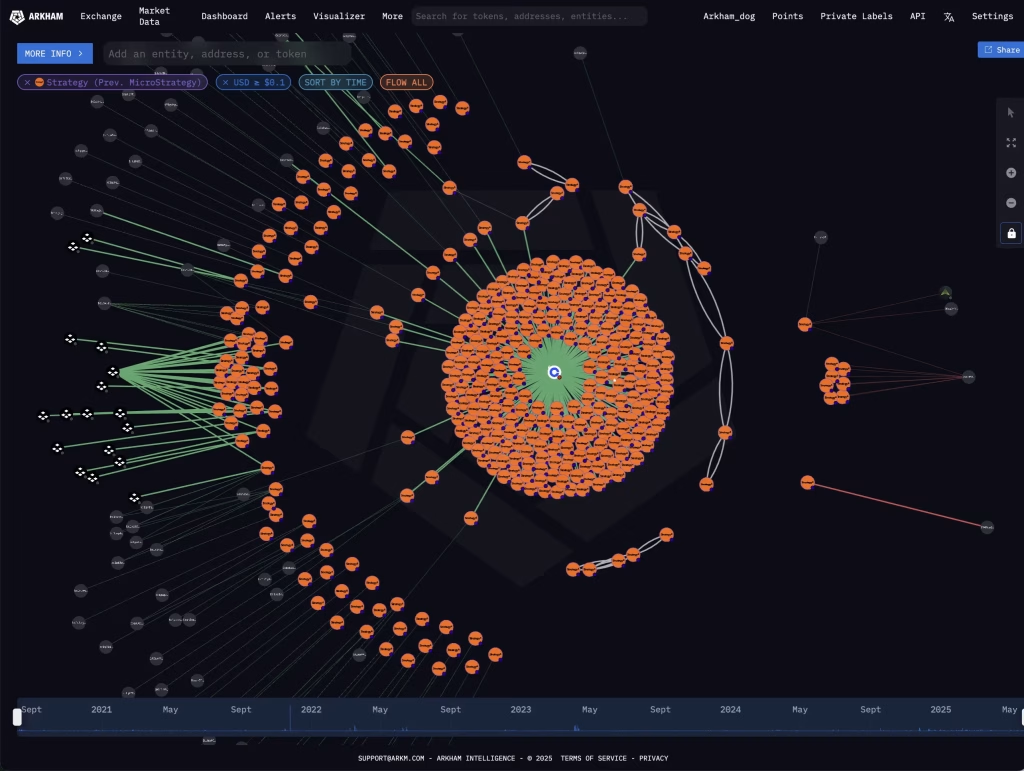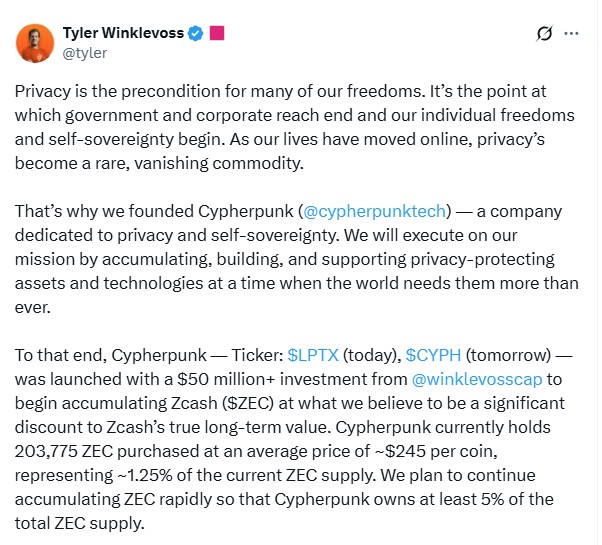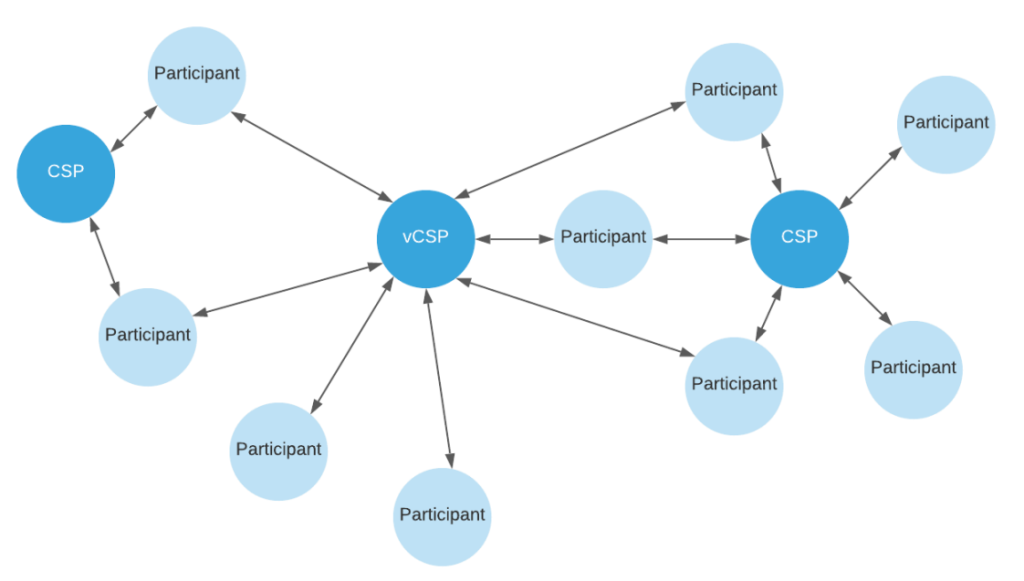After years touting the amazing transparency of blockchains, the crypto community has started to realize that privacy is actually essential for many traders, businesses and individuals.
Until now, balancing the right to privacy with the need to avoid jail time on money laundering charges has proven a difficult task, as the developers of Tornado Cash and Samourai Wallet have discovered.
But 2026 is the year that pragmatic privacy is poised to take off, with a slew of new projects tackling compliant forms of privacy for institutions and surging interest in existing privacy coins like Zcash — cheered on by Solana influencer Mert Mumtaz.
The Ethereum Foundation has formed a crack team of privacy experts to beef up protections in its ecosystem, while Coinbase is lobbying for updated regulations that don’t assume only bad actors want privacy.
Simon Seojoon Kim, CEO and founder of blockchain development firm Hashed, summed up the issues with blockchain transparency in a blog earlier this year:
“Web3 promised decentralization and privacy, but it actually created the most transparent surveillance system in history,” he wrote.
“Every transaction is permanently recorded, visible to everyone, and analyzed by AI. While there’s no rational reason to expose large leveraged positions, even hiding them in Web3 is nearly impossible.”
Once an address is connected to an individual, the game is up: real-time transaction history is exposed, position sizes are obvious and AI and bots can learn and analyze trading patterns.
The most famous example comes from May this year, when the entire crypto industry watched as anon trader James Wynn took out a $1.1 billion position with 40-times leverage on Hyperliquid. “Traders worldwide monitored this position in real-time, with blockchain analytics platforms transparently broadcasting every movement,” Kim said. Synthetix is relaunching this month as a perps DEX on Ethereum, talking up the fact trades are private by comparison.
Yuval Rooz, the co-founder and CEO of Digital Asset, the company that developed the tech behind Canton, the privacy focused blockchain network for financial institutions, says that the kind of tracking and exploitation of other traders’ positions, which is endemic in the crypto market, “would be considered to be a high, serious violation of market manipulation” in traditional financial markets.
For businesses the problem is even more acute, letting competitors see the inner workings of what a firm is buying and selling and from whom down to the last decimal place. It also tips off hackers to the location of a honeypot.
Michael Saylor, the chairman of Bitcoin reserve company Strategy, said he’d never reveal his company’s addresses, citing security concerns. But in May, blockchain analytics firm Arkham Intelligence announced they were confident they’d identified them.

Currently, those who wish to conceal trades are forced to employ advanced methods of hiding their addresses and identities using multiple wallets, dummy trades and proxy contracts. VPNs, separate trading-dedicated devices, and time-zone-distributed trading patterns are now standard for many.
But these methods are a poor facsimile of a genuinely private system, where identities and transactions are shared only on a need-to-know basis. But this begets another question: In an increasing regulated market, where adoption means compliance, how can regulators be comfortable with privacy?
Coinbase and Canton are getting regulators on board
One of the big issues with privacy is that financial regulators are often wary of it.
Privacy advocates maintain that regulators’ approaches to privacy and consumer protection are archaic, and need to be replaced in order to provide the security they really want.
Agata Ferreira, a board member for Blockchain for Europe and an assistant professor at the Warsaw University of Technology, argues that regulators’ “logic of shared observation” — that the more transparent something is — the safer it is, “is outdated and dangerous.”
“In a world where everyone is being watched, and where data is harvested on an unprecedented scale, bought, sold, leaked and exploited, the absence of privacy is the actual systemic risk.”

Posting about the EU’s Chat Control proposal, which would have required messaging platforms to let regulators scan encrypted messages, Vitalik Buterin said that privacy is not illegitimate.
“It is a minority (far from a majority!) in government and tech industry that is pursuing a type of absolutism, where they openly use phrases like ‘there should be no place to hide,’ seeking a kind of utopia (from their perspective) where they have the ability to see everything and nothing is out of bounds.”
“What I ask for is quite balanced, it’s simply that we should have privacy in our digital communications and activities.”
Rooz says that at Canton, “we try to explain to regulators that you could still have the full benefits of this innovation without having to do a wholesale replacement of everything that we’ve known to date.”
Not that he believes the current regulations are perfect, but “I think that it’s unrealistic and it’s irresponsible to just ask for a wholesale change of everything we’ve known to date, because ‘we just know better.’”
The crypto lobby has been offering suggestions. In October, crypto exchange Coinbase wrote a letter to the US Department of the Treasury, outlining how and why the Anti-Money Laundering and Know Your Customer frameworks should be updated to incorporate decentralized alternatives.
Among the proposed policy solutions were updating the Bank Secrecy Act to include decentralized ID and zero-knowledge proofs as valid identification. It also proposed using blockchain analytics clustering to analyze AML compliance.
As blockchain protocols make their case to regulators, they’re building the technology to support decentralized privacy.
Building: EF, Bhutan and Zcash
In early October, the Ethereum Foundation announced the establishment of the “Privacy Cluster,” comprising 47 experts, to develop features such as private payments and decentralized identity solutions for the Ethereum blockchain.
The cluster followed the September introduction of the Privacy Stewards for Ethereum, a privacy-focused research and development initiative.
Coinbase CEO Brian Armstrong announced on Oct. 22 that his exchange was working on private transactions after acquiring Iron Fish, a team that was working on privacy technology, in March.
Base is building private transactions.
— Brian Armstrong (@brian_armstrong) October 21, 2025
We acquired the Iron Fish team back in Mar 2025 to start working on this. More to share soon. https://t.co/ZzRHZRH9yN
The Himalayan kingdom of Bhutan has even adopted a private, blockchain-based ID, migrating its BhutanNDI system to the Ethereum blockchain in October.
According to recent data from a16z, interest in privacy-related Google searches is spiking. The amount of Zcash held in shielded/private pools is increasing, as are total flows through the Railgun privacy system.
Winklevoss Capital has just launched a Zcash treasury company called Cypherpunk Technologies, which already holds 1.25% of the supply. “We feel strongly that Zcash could become a meaningful percentage of Bitcoin’s market capitalization — just on the merits of it being a privacy hedge or insurance policy to Bitcoin’s transparency alone,” said Tyler Winklevoss.
Now, Rooz says, “Suddenly privacy is a feature rather than a bug.”

What is privacy in crypto?
Developers at the Canton Network have been working on these issues since 2016, with the network’s white paper published in 2020. Launched in 2023 with a consortium of banks and tech firms, includingBNP Paribas, Cumberland, Deloitte, Goldman Sachs and Moody’s, the “network of networks” aims to connect disparate financial systems while offering compliant privacy.
“Doing privacy in a way that works is not a trivial task,” Rooz tells Magazine.
“It’s taken that long to build a technology, test it and verify that it actually does what it’s supposed to be doing.”
The Canton Network decouples state storage and execution, validation, and sequencing to enable more customizable and controllable forms of disclosure. Transaction data is distributed only to the relevant parties on a “need to know” basis, with permissioning and visibility defined on an app-by-app basis through smart contracts.
Information passing through the nodes is end-to-end encrypted, and the Global Synchronizer ensures composability across independent applications and subnets, without sacrificing privacy or control over how apps operate.
Rooz says there are different conceptions about what privacy is, or should be.
He says that it’s nice to “have a single word” like privacy, which “you can just hide under and say, ‘Oh, I’m doing privacy.’ Privacy sounds great. But we don’t actually think that all privacy solutions are created equal.”
For Rooz, privacy is the ability for stakeholders to contract and to share information on a need-to-know basis. He gives the example of an NDA.
“If you and I sign an NDA, it will say that you and I are the ones who are allowed to see the details of that NDA. It will also have all kinds of conditions, like maybe our service providers can see the NDA, like our lawyers or our accountants or our auditors, and it will also have these covenants in the contract that will say under certain conditions, you can even expand the privacy perimeter to regulators or to the court, or people that have authority to kind of like look into or through that contract.”
However, anyone who is not one of the mentioned parties or who does not need to know about the contract has no knowledge of or access to it.
Zero-knowledge proofs: Some of the answer but not all
One of the big breakthroughs in privacy in recent years has been zero-knowledge proofs. This is a way to mathematically prove something is true without handing over all the details.

ZK-proof technology works well in certain circumstances, for example, proving one’s age without giving away other sensitive ID information like your address or the actual date of birth itself. The Billions Network, for example, provides a decentralized digital ID alternative to World using ZK.
However, this may not be entirely suitable for the financial industry. Rooz cites a 2019 Zcash bugthat could haveallowedhackers to infinitely mint cryptocurrency using a faulty version of zk-SNARKs.
While Zcash believes the bug was never exploited, hackers could have transformed a zero-knowledge proof of one statement into a valid-looking proof of a different statement, breaking the network’s proving system.
“The problem is when you start thinking about financial services and there is an actual financial outcome that could be really consequential based on the inputs being correct. Relying on a black box just to tell you, ‘Trust me, it’s all good. Everything inside is working fine. You don’t really need to see…’ It’s not a good thing in financial services.”
Regulators may not be convinced either. When checking whether a company has done its AML or KYC, a watchdog may want a more satisfactory answer than “This black box gave me a lot of green lights.”

They’ll want a sample of clients, with actual details. “A regulator will want to say, show me that you didn’t do any money laundering activities. Show me all of the financial activities. And who are the people that have been doing these activities?”
Rooz emphasizes that Canton is not opposed to zero knowledge. Quite the opposite, Canton co-founder and chief operations officer Shaul Kfir helped pioneer the technology with the co-authoring of libsnark, a C++ library for creating zk-SNARK proofs. “But it’s important to understand what the technology is good for.”
Canton believes its suite of private but compliant tools will lead to more institutional adoption. In this conception, privacy is not a black box where decisions are made, but a protected circle for those who need to be in the know.


Aaron Wood
Is Bitcoin heading back to $90K? Solana ETFs, and more: Hodler’s Digest, Nov. 17 – 23
A crypto trader mulls over whether Bitcoin will retrace back to $90,000, Solana ETF filings flood in and more: Hodlers Digest
Read moreBlockchain and the world’s growing plastic problem
“People are being asked to make changes to help mitigate climate change, but I can’t pull a CO2 molecule from the air and show it to you.”
Read more9 weirdest AI stories from 2025: AI Eye


